- Home
- Gordon Korman
Losing Joe's Place Page 3
Losing Joe's Place Read online
Page 3
“And then?” asked Don.
“And then you feed another sheet,” his uncle replied.
“That’s it?”
“That’s it,” he said cheerfully. “Until coffee break. Then until lunch. Then until five.”
I felt my eyes glazing over. A guy who didn’t speak English escorted us to our places in a huge assembly line, issued us safety glasses, wished us what sounded like, “Fuffle leffer thuffs,” and left us to our fate.
About eight thousand bubble wands later, I dared to look up and glance over at Ferguson. He had already run out of plastic sheets and, while awaiting a new supply, was gazing around with rapt interest. Now, that was always a danger sign. When the Peach started thinking about something, chances were he was redesigning, fixing, and improving in his mind.
Don noticed this, too, and at coffee break made his opinion clear. “Look, Peachfuzz, if you stick your nose into everybody’s business and get yourself fired, don’t expect Jason and me to support you.”
“I haven’t said a word,” said Ferguson blandly. “I’m too involved in this fascinating job.”
Don flushed red. “You think you’re too good to work on an assembly line? During World War II, what made this country strong? Our production lines, that’s what!”
Ferguson nodded sagely. “I guess World War III is going to be fought with bubble wands. What are we going to use for ammo — atomic soap?”
I had to step in. “Cut it out, you guys. There’s nothing wrong with our jobs. Everybody has to start at the bottom.”
At that point, the foreman stood up and bellowed, “Flangel dipla noof-spif!” and about sixty people went back to work, so we went, too.
It happened less than an hour before quitting time. I was carrying my bin of plastic cuttings to the recycling station when I noticed that Ferguson had left his machine. I spotted him seated at the production computer, explaining something to two fascinated engineers.
“I’ll kill him!” hissed Don behind me.
“You’ll have to get in line!” I was feeling pretty homicidal myself. Here we were, first day on the job, dying to make a good impression, and there was Ferguson, goofing off, playing with a computer. We both stood there, signaling at the oblivious Ferguson, until the foreman ordered us back to work. At least, I think he did. I had developed the theory that “noof-spif” meant “work.” What language was that?
All the way home, we gave it to Ferguson. As usual, the Peach was totally calm.
“I didn’t desert my machine,” he explained, hanging on by two fingers to a leather strap while our packed bus sat in traffic. “The chief engineer was having a temper tantrum, and he yelled that he couldn’t understand why no one in the company was familiar with the Magnetronic 500 series computer. So I told him the truth. I know all about it.”
“You were supposed to mind your own business,” growled Don. “Make sure it doesn’t happen again.”
“Don’t worry about that,” said Ferguson. “The design software is all de-bugged now. Tomorrow I can go back to the business of making bubble wands, for in a world without bubble wands, I do not wish to live.”
Score another one for the Peach. Don seethed the rest of the way home.
* * *
Bubble wands became as much a part of our world as breathing, eating, sleeping, and calling the police to ask about Joe’s car. As the week went by and the numbers mounted up towards that magic tally of 800,000, I started having dreams about traveling through the universe, trapped inside a giant bubble, blown by colossal lips through the great-granddaddy of all bubble wands.
Don, too, was having bubble trouble in his dreams, and woke up each morning with the taste of soap in his mouth.
Each day we spent our commuting time counting up all the bubble sets we’d owned in grade school. We’d been so young we’d thought they’d grown on trees or something, not that some poor sap had to stand there all day, feeding dumb sheets of plastic into a dumb machine.
I suppose I don’t have to mention the interest factor, which was approximately zero. In fact, the only thing that kept us from lapsing into a coma on the job was the noise. The stamping machine made a crashing sound that would jar your back teeth loose. One night I caught Ferguson, crouched over Don’s sleeping form on the couch, yelling, “Ka-chunk! Ka-chunk!” into his ear. The Peach dove back into his bed just as Don awoke with a start, scared that he’d fallen asleep at his machine. The Peach was like that sometimes.
Impressions of my first job: When I pick my real career, it’s going to be something quiet, like florist, or mortician.
Ferguson had none of these problems. As the week progressed, he spent less and less time making bubble wands. When we arrived at the plant on Tuesday morning, four engineers and two computer programmers were crowded around the Peach’s machine, waiting for him. He was whisked off to the production computer for a consultation that lasted until noon.
Back at his machine after lunch, the Peach barely had the chance to make a few hundred bubble wands before two men from the executive offices came and spoke at length with the chief engineer. In no time at all, Ferguson stuck his nose into that, too, and soon he was typing away at the computer, as the execs were laughing, applauding, and patting him on the back.
Don was furious. “You know what’s going to happen when they count his production and see how many wands he didn’t make today? He’s putting all our jobs in jeopardy!”
I was looking in perplexity at the production computer. “He certainly seems to be getting along well with all the muckamucks.”
“Sure. He’s goofing off, making friends, while we work our butts off. It can only end one way. He’s going to get canned.”
I shrugged. “Well, if he does, he’ll just have to find another job. He can’t expect us to support him all summer.”
Don jammed a sheet savagely into the stamper. “I’m not feeding him. Peachfuzz starves. The world will be better off.”
I smiled in spite of myself. “Come on.”
“It’ll be a national holiday,” Don insisted, his eyes growing dreamy. “‘No More Peachfuzz Day.’ I can see it now — a big parade, with little children carrying peach pits. And after the mayor’s speech, they all chant, ‘Nothing needs fixing! It’s all okay!’ Then they throw their peach pits down the sewer.”
We both laughed. We feeders get a little crazy sometimes. It comes from all the responsibility. It’s one of those big stress jobs.
* * *
It was amazing how quickly 1 Pitt Street became home. We fell into a routine: breakfast at the Olympiad, brown bag lunches, various snacks at home, and dinner out. That gave us a chance to explore a different part of the city every night, and soon we knew the bus and subway routes as though we’d been here all our lives.
Ours was a quiet building, if you didn’t count Plotnick and his big mouth. Our contact with the neighbors was generally nothing more than a polite smile or wave, and a murmured “Good morning.” We never even got to know their names, as the apartment doors were unmarked, and the landlord took in the mail and handed it out himself, since there were no individual boxes. So we developed our own secret nicknames for our fellow tenants.
Apartment 2A, right across the hall, housed the Stripper, a six-foot-tall lady with a fabulous figure. We figured she’d started out as a dewy-eyed starlet, but now, pushing forty from the wrong side, she was the makeup company’s best customer. Plotnick tried to convince us what a high-class building he ran by telling us she was an artistic dancer. But Don saw through this.
“A dancer just dances,” he explained. “An artistic dancer dances without clothes. The more artistic, the less clothes.”
Next to 2A was 2B, the love nest of Romeo and Juliet. They were a middle-aged couple who went to work every morning, took their meals in the deli, and spent all the rest of their time kissing. 2C was us, and our next door neighbor in 2D was the Phantom. We never saw the Phantom, since he never left the apartment. But he was Plotnick’s favorite
tenant, because he always paid the rent on time.
“He didn’t make me one hassle,” said the landlord fondly. He glared at Ferguson and Don. “And he never has houseguests.”
The weird part was, for a guy who stayed cooped up inside his apartment, the Phantom seemed to have a vast acquaintance. He was on the phone with friends all day and half the night. We envisioned apartments all over town, with other Phantoms, all having elaborate social lives without ever stepping out the door.
The stairway up to the third floor was the steepest, narrowest, darkest, and most treacherous climb this side of Everest. Up this cliff, several times a day, ascended a tiny, frail, silver-haired lady who looked about two hundred years old. We called her God’s Grandmother.
God’s Grandmother was the friendliest person in the building, and had a smile for everyone, even Plotnick. She must have been in better shape than she looked, because she jogged several times each day. It was torture to watch. She fluttered along the sidewalk like a leaf in the wind, and every step seemed like it would be her last.
Another denizen of the third floor was the Ugly Man, who really wasn’t all that ugly, except that he had only one thick, black, bushy eyebrow, which stretched all the way across his forehead. His beady little eyes peered out from under it like a rodent hiding in a hedge. He was the least congenial tenant, and always seemed to be muttering obscenities under his breath. My mother couldn’t have washed his mouth out with soap. She’d have had to go for the Drano.
Maybe the Ugly Man was in this lousy mood because he was in love with another neighbor, Wayne Gretzky’s Sister. We named her that because she looked exactly — I mean — exactly like a female version of Don’s hero, Wayne Gretzky. We didn’t see much of her but, when we did, she was usually studiously ignoring the Ugly Man.
That left the quietest tenant of 1 Pitt Street, a man we called the Assassin. He was kind of a mystery — a guy in a crummy third floor walk-up, who wore fifteen-hundred-dollar suits and Gucci loafers. He had a waxed mustache, and the coldest eyes you’ve ever seen. He came and went at odd hours, and always carried a thin black attaché case — perfect size for a machine gun. Even when we found out he was a librarian, we kept up his nickname. He looked like Death, swift and professional.
Last, but not least, came Plotnick himself, who lived in a large apartment on the first floor behind the deli. If nothing else, our landlord was fair. He was no nastier to us than to the rest of his tenants and deli customers.
We fit right in. The Stripper, Romeo and Juliet, the Phantom, God’s Grandmother, the Ugly Man, Wayne Gretzky’s Sister, the Assassin, and the Three Stooges.
And as I drifted off to sleep listening to the Phantom on the phone, planning the menu for a party he would never attend, I reflected that the Dream Summer was shaping up pretty well. If we could get the car back, and if Don and I could just keep Ferguson out of trouble at work, everything would be fine.
FOUR
On Wednesday, Ferguson Peach’s lack of productivity at Plastics Unlimited came to the attention of the foreman. At least, we think it did. He stood in front of the Peach at coffee break and gave him a long lecture about “noof-spif,” which we were pretty sure meant “work.”
“You see?” Don challenged after the foreman had moved on to fuffle at somebody else. “If you don’t smarten up and do some work, you’re out of here.”
“You look after your noof-spif,” said Ferguson, “and I’ll look after mine.”
“You aren’t doing any noof-spif!” wailed Don.
But Ferguson was on his way to the production computer, where the engineers waited, checking their watches and wringing their hands.
On Thursday, Ferguson didn’t make any bubble wands at all. Instead, he held court at the computer, typing furiously, stopping only to make rough sketches on paper.
“That’s it!” seethed Don. “No more Mr. Nice Guy! As soon as he gets back here, he goes into the stamping machine! Some poor kid’s going to get a Peachfuzz bubble wand — which’ll keep telling him how to blow better bubbles!”
But Ferguson did not return. Instead, more and more people gathered at the computer to see what was going on. By coffee break, the entire engineering staff was there, and the excited babble was drowning out the stamping machines. As the morning wore on, executives trickled one by one from the offices to crowd around Ferguson until, finally, Don’s Uncle Harry, president of the whole company, came to investigate the goings-on.
Don was turning purple.
All eyes were on the screen as Ferguson deftly pounded the keyboard. Then he got up and pointed to several places around the plant. After that, the whole crowd of thirty-plus people disappeared into the executive offices, taking the Peach with them.
Three hours later, we were summoned to see Don’s uncle. Don had a plan. “I’m going to save our jobs at all costs, Jason, so don’t try to stop me. When my uncle asks what’s the story here, I’m going to nail Peachfuzz to the wall. I’ll say we hardly even know the idiot, and that we only need him for the rent. Then I’ll apologize like crazy, and maybe we’ll get through this one alive.”
I was really confused. Was Ferguson about to be fired? All I could think of was my summer. Could Ferguson get another job, or would he be on the train back to Owen Sound tomorrow? Could Don and I cover the rent on just two salaries? Or would we be back on the train after Ferguson’s, to be greeted by my father and his four favorite words — I, told, you, and so? I gritted my teeth. If that happened, there really would be a “No More Peachfuzz Day.” I, Jason Cardone, would throw out the first peach pit.
* * *
“Donny, where did you find this guy?” Uncle Harry was referring to Ferguson, who was seated in a big leather chair while we stood.
I could see the wheels turning in Don’s head. But when he opened his mouth, only panic poured out. “He’s nobody! I never met him before in my life! He’s an idiot! Just some guy off the street! I’m not responsible! Don’t blame me!”
Harold Robb just stared at his nephew. “An idiot? Why, Fergie is the most remarkable young man it’s ever been my pleasure to meet. I can’t thank you enough for bringing him to me.”
Don goggled. “You’re welcome.”
The president got up and put his hand on the Peach’s shoulder. “He’s a genius! He’s going to save this company millions! In all my years in business, I’ve never met such a gifted individual. Do you know that he can take a look at an operation, and immediately see ways to improve it?”
No kidding. Don and I exchanged glances. The Peach’s expression didn’t alter.
“Which is what I’ve brought you in here to discuss. Part of Fergie’s complete plant overhaul involves an automatic feeding system, so Plastics Unlimited doesn’t need feeders anymore.”
It took a second or two for this to sink in.
“We’re fired?” I barely whispered.
Don was stunned into silence.
“Of course not,” said Uncle Harry. “Can’t run the place without my boy Fergie. But you two — well, that’s business, right? Tomorrow’s your last day.”
“But — but you’re my uncle!” gasped Don.
“All the more reason why you don’t want any special treatment,” beamed our ex-employer. “A man’s got to make his own way in this world. Just look at Ferguson here. What a mind! What a mind!”
Don was begging now. “Couldn’t we be transferred to another section?”
“Sorry, we’re fully staffed. And you have the least seniority, so you have to go.”
“But I’m family!” Don whined.
“Nepotism has no place in business,” his uncle replied. “This is a tough world, Donny. Think of how fortunate you are to learn all about it at your age.”
The end.
* * *
Ferguson was invited to stay and have dinner with the executives, and Don and I went home. By unspoken agreement, we jammed all the Peach’s clothes into his suitcase, zipped it up, and threw it out the window. Then we tu
rned out all the lights and cranked the stereo up to 9.
At eight-thirty, Ferguson showed up, good‑natured as ever, suitcase in hand. We had no words; we just stared grim death at him.
He said, “Sorry,” and began to unpack.
I blew up. “Sorry? Sorry? We’re obsolete, thanks to you! Now what are we supposed to do — go down to the museum and stand in a glass case marked Feeders. Late Twentieth Century?”
The Peach just shrugged.
Don went for his throat, and I had to leap between them. “The important thing,” I said, straining to hold them apart, “is that we can’t let our parents find out we’ve been fired. Remember, the jobs were the number-one condition for this trip.”
“Right!” exclaimed Don. He shook his fist at Ferguson. “If you slip up in one of your hourly letters to Mommy, and mention us getting canned, our folks’ll freak out and drag us back home.”
“I’ll take it under advisement,” murmured the Peach.
But I knew Ferguson wouldn’t tell. And Don’s uncle was no risk — he couldn’t even remember which of his sisters was Don’s mother. Absolutely nobody could know we’d lost our jobs.
* * *
When we went down to the deli for breakfast the next morning, we found The Toronto Star Employment section spread out on the table of our booth.
I looked over at Plotnick, who was behind the counter, involved in a hubcap sale. “What’s this for?” I called.
The landlord looked up. “Just in case you should happen to know two persons looking for employment as of today.”
“Yeah, well, we don’t know anyone,” I snapped. Was Plotnick psychic or something?
Plotnick handed the hubcap customer his change. “Okay, Mr. Cardone, but just remember, the first of the month is coming this weekend. And jobs for feeders are hard to come by with all the mechanization these days.”
I spied the ventilation duct grating right behind Plotnick’s head. “Mr. Plotnick, have you been listening in on us?”
The landlord brandished his meat fork defensively. “It’s my fault you gentlemen are yelling and screaming all the time? You want privacy? Try talking like a normal person.” He waddled over to our booth, and I tried to picture him trussed up like a roast pig, with an apple in his mouth. “Okay, what’ll it be? Mr. Peach, you first, since you’re paying the bills from now on. And by the way, congratulations on your promotion.”

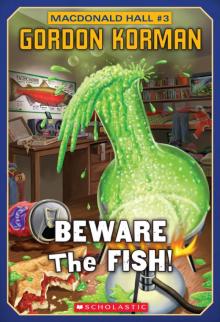 Beware the Fisj
Beware the Fisj Slacker
Slacker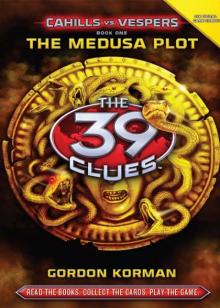 The Medusa Plot
The Medusa Plot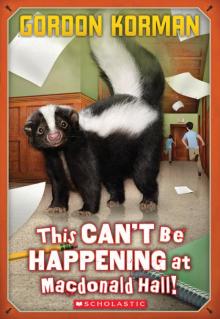 This Can't Be Happening at MacDonald Hall!
This Can't Be Happening at MacDonald Hall!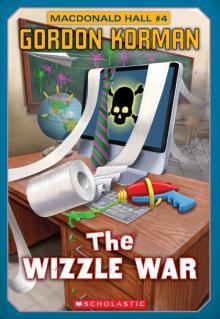 The War With Mr. Wizzle
The War With Mr. Wizzle The Emperor's Code
The Emperor's Code Zoobreak
Zoobreak The Danger
The Danger Unsinkable
Unsinkable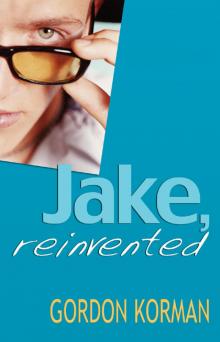 Jake, Reinvented
Jake, Reinvented No More Dead Dogs
No More Dead Dogs The Stowaway Solution
The Stowaway Solution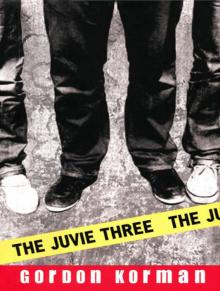 The Juvie Three
The Juvie Three The Climb
The Climb Criminal Destiny
Criminal Destiny Hideout: The First Adventure
Hideout: The First Adventure Flashpoint
Flashpoint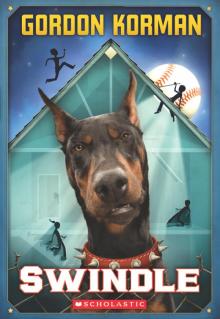 Swindle
Swindle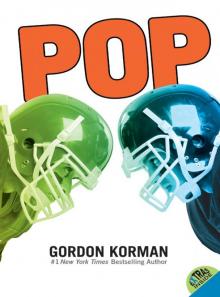 Pop
Pop The Rescue
The Rescue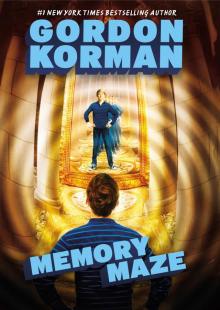 Memory Maze
Memory Maze The Sixth Grade Nickname Game
The Sixth Grade Nickname Game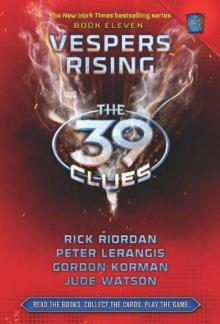 Vespers Rising
Vespers Rising Collision Course
Collision Course The Abduction
The Abduction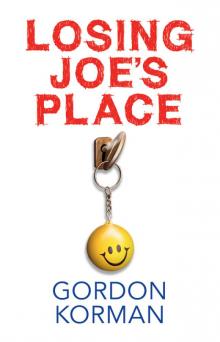 Losing Joe's Place
Losing Joe's Place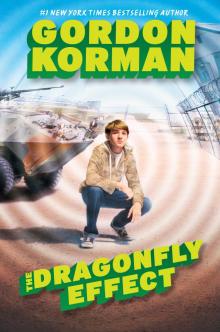 The Dragonfly Effect
The Dragonfly Effect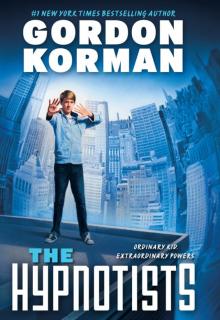 The Hypnotists
The Hypnotists Survival
Survival Lights, Camera, DISASTER!
Lights, Camera, DISASTER! Payback
Payback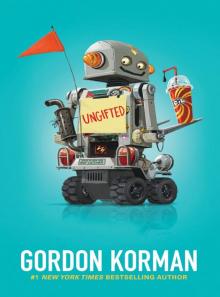 Ungifted
Ungifted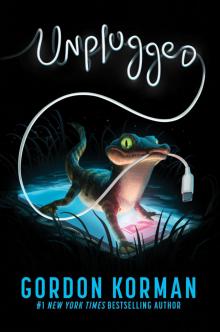 Unplugged
Unplugged Framed
Framed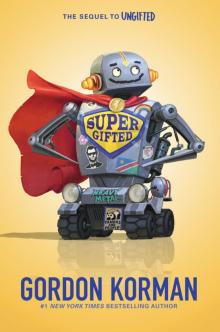 Supergifted
Supergifted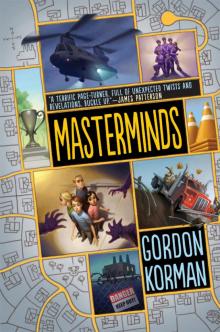 Masterminds
Masterminds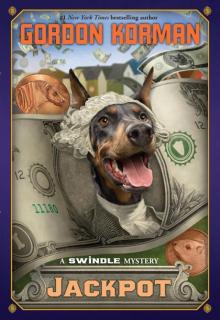 Jackpot
Jackpot Don't Care High
Don't Care High The Deep
The Deep Go Jump in the Pool!
Go Jump in the Pool! The Contest
The Contest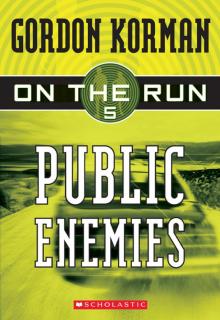 Public Enemies
Public Enemies Hideout: The Second Adventure
Hideout: The Second Adventure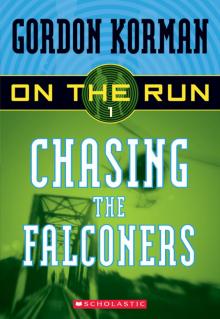 Chasing the Falconers
Chasing the Falconers One False Note
One False Note Shipwreck
Shipwreck Jingle
Jingle Unleashed
Unleashed Son of the Mob
Son of the Mob Now You See Them, Now You Don't
Now You See Them, Now You Don't War Stories
War Stories Schooled
Schooled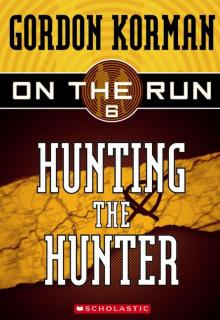 Hunting the Hunter
Hunting the Hunter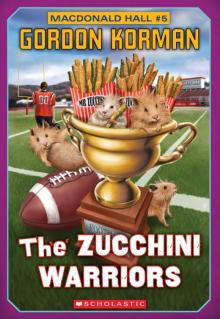 The Zucchini Warriors
The Zucchini Warriors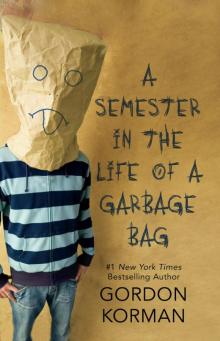 A Semester in the Life of a Garbage Bag
A Semester in the Life of a Garbage Bag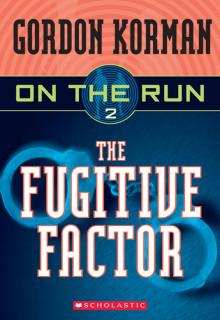 The Fugitive Factor
The Fugitive Factor Born to Rock
Born to Rock The Summit
The Summit Showoff
Showoff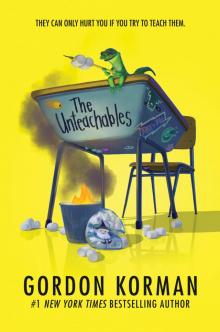 The Unteachables
The Unteachables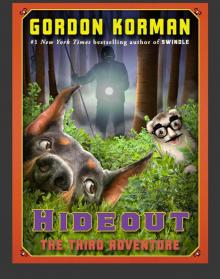 The Third Adventure
The Third Adventure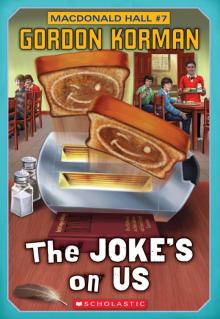 The Joke's on Us
The Joke's on Us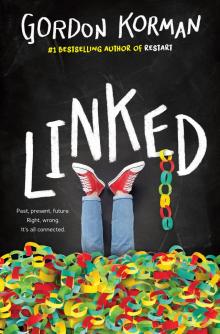 Linked
Linked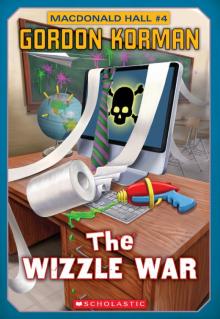 The Wizzle War
The Wizzle War The 6th Grade Nickname Game
The 6th Grade Nickname Game The Second Adventure
The Second Adventure The First Adventure
The First Adventure![39 Clues : Cahills vs. Vespers [01] The Medusa Plot Read online](http://i1.bookreadfree.com/i2/04/10/39_clues_cahills_vs_vespers_01_the_medusa_plot_preview.jpg) 39 Clues : Cahills vs. Vespers [01] The Medusa Plot
39 Clues : Cahills vs. Vespers [01] The Medusa Plot